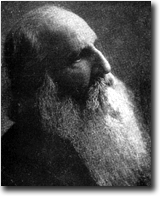A Quote by William Blackstone
There is nothing which so generally strikes the imagination, and engages the affections of mankind, as the right of property; or that sole and despotic dominion which one man claims and exercises over the external things of the world, in total exclusion of the right of any other individual in the universe. And yet there are very few, that will give themselves the trouble to consider the original and foundation of this right.
Related Quotes
It is not the right of property which is protected, but the right to property. Property, per se, has no rights; but the individual - the man - has three great rights, equally sacred from arbitrary interference: the right to his life, the right to his liberty, the right to his property The three rights are so bound together as to be essentially one right. To give a man his life but to deny him his liberty, is to take from him all that makes his life worth living. To give him his liberty but take from him the property which is the fruit and badge of his liberty is to still leave him a slave.
Coincident with the right of individual property under the provisions of our Government is the right of individual property. . . . When once the right of the individual to liberty and equality is admitted, there is no escape from the conclusion that he alone is entitled to the rewards of his own industry. Any other conclusion would necessarily imply either privilege or servitude.
Civil rights are those which appertain to man in right of his being a member of society. Every civil right has for its foundation some natural right pre-existing in the individual, but to the enjoyment of which his individual power is not, in all cases, sufficiently competent. Of this kind are all those which relate to security and protection.
It is self-evident that no number of men, by conspiring, and calling themselves a government, can acquire any rights whatever over other men, or other men's property, which they had not before, as individuals. And whenever any number of men, calling themselves a government, do anything to another man, or to his property, which they had no right to do as individuals, they thereby declare themselves trespassers, robbers, or murderers, according to the nature of their acts.
There is a very broad theory that society gets the right to hang, as the individual gets the right to defend himself. Suppose she does; there are certain principles which limit this right. Society has got the murderer within four walls; he never can do any more harm. Has society any need to take that man's life to protect itself? If any society has only the right that the individual has, she has no right to inflict the penalty of death, because she can effectually restrain the individual from ever again committing his offence.
Mankind will someday realize that we are actually in contact with the dead and with the other world, whatever it is; right now we could predict, if we only exerted enough mental will, what is going to happen within the next hundred years and be able to take steps to avoid all kinds of catastrophes. When a man dies he undergoes a mutation in his brain that we know nothing about now but which will be very clear someday if scientists get on the ball. The bastards right now are only interested in seeing if they can blow up the world.
Conscience is the most sacred of all property; other property depending in part on positive law, the exercise of that being a natural and unalienable right. To guard a man's house as his castle, to pay public and enforce private debts with the most exact faith, can give no title to invade a man's conscience, which is more sacred than his castle, or to withhold from it that debt of protection for which the public faith is pledged by the very nature and original conditions of the social pact.
Miss Goldman is a Communist; I am an Individualist. She wishes to destroy the right of property, I wish to assert it. I make my war upon privilege and authority, whereby the right of property, the true right in that which is proper to the individual, is annihilated. She believes that co-operation would entirely supplant competition; I hold that competition in one form or another will always exist, and that it is highly desirable it should.
No, nothing is sacred. And even if there were to be something called sacred, we mere primates wouldn't be able to decide which book or which idol or which city was the truly holy one. Thus, the only thing that should be upheld at all costs and without qualification is the right of free expression, because if that goes, then so do all other claims of right as well.
It is alone that part of the external universe which we call material which acts on man through his senses - that part of which we ordinarily feel our knowledge to be the surest; but in reality, strangely enough, as will soon appear, this is one of the aspects of the external world, of which we can know nothing.
No man can delegate,... any right of arbitrary dominion over a 3rd person; for that would imply a right in the 1st person, not only to make the 3rd person his slave, but also a right to dispose of him as a slave to still other persons. Any contract to do this is necessarily a criminal one...To call such a contract a “constitution” does not at all lessen its criminality, or add to its validity.






























